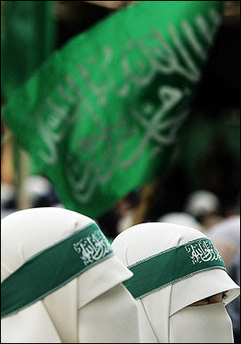|
Hamas makes first parliamentary appointments
(Reuters)
Updated: 2006-02-16 11:09
Hamas made its first parliamentary appointments on Wednesday as Israel
prepared to decide on its strategy toward the Palestinians after the Islamic
militant group takes up the reins of power.
Hamas named Mahmoud al-Zahar
from Gaza, one of its most hardline leaders, as head of its majority faction in
the legislature, which convenes on Saturday for its first session since the
group won the January 25 Palestinian election.

Palestinian
supporters of the Islamic movement Hamas take part in a rally at the
Islamic University of Gaza City, 01 February. The House of Representatives
voted overwhelmingly to withhold direct US foreign aid from the
Palestinian Authority unless Hamas revokes its call for the destruction of
Israel.[AFP] | Aziz Dweik, from the West Bank, was
chosen by Hamas as parliamentary speaker.
As the leader of parliament, Dweik would become interim president, pending an
election within 60 days, in the event of the death, resignation or
incapacitation of President Mahmoud Abbas of the Fatah faction.
The appointments raised speculation Hamas would choose another of its
leaders, Ismail Haniyeh, as prime minister. A Gazan, he is viewed by
Palestinians as a pragmatist who has forged good relations with rival factions.
Hamas officials have said they expect the group to announce its choice for
the post as early as Saturday or Sunday, after parliament convenes and before
Israel holds its own election on March 28.
With the clock ticking toward formation of a Palestinian government, Israeli
Foreign Minister Tzipi Livni summoned advisers for consultations that one
official said would focus on "funding for the Palestinian Authority in the Hamas
era."
Israeli officials have said Israel is trying to persuade donor nations to cut
off support for the Palestinian Authority once a parliament dominated by Hamas
is sworn in. Hamas's charter calls for Israel's destruction.
After the meeting led by Livni, Israel Radio said citing political sources
that the government would likely allow funds to continue reaching humanitarian
groups in Palestinian areas.
ISOLATION
The United States and Israel hope to isolate a Palestinian government headed
by Hamas financially and diplomatically to pressure it to renounce violence,
recognize the Jewish state and honor interim peace agreements, U.S. and Israeli
officials say.
"You can call it isolation, you can call it a boycott, but you can also call
it reality," Israeli President Moshe Katsav told reporters in Athens. "We cannot
renegotiate that which is already agreed."
Katsav criticized Russia's invitation to hold talks with Hamas, saying it
"erodes the position of the international community."
But Russian Foreign Minister Sergei Lavrov said it was a realistic way to
foster future peacemaking. "Unless we engage Hamas, which gained power as result
of legitimate, free and fair elections, nothing will change," he said in Vienna.
Palestinians receive about $1 billion a year from all donors and the
Palestinian Authority requires at least $100 million a month. Palestinian
officials have said they expect Saudi Arabia, UAE and other Arab states to boost
the amount of support they provide to the authority in the coming months.
Israeli Defense Minister Shaul Mofaz planned to convene his advisers on
Thursday to discuss security policy toward the Palestinians with Hamas in the
government.
Hamas has masterminded nearly 60 suicide bombings against Israelis since a
Palestinian uprising began in 2000, but has largely adhered to a truce declared
last March.
Israeli security sources said proposals could include a tightening of travel
restrictions for Palestinians in the occupied West Bank, where Israel is
building a barrier it says is vital to its security and the World Court has
deemed illegal.
In a posting on a Hamas Web site, the group's armed wing, Izz el-Deen
al-Qassam, said its fighters had received funding and training from the
Iranian-backed Hizbollah movement in Lebanon, a link long denied by Hamas
leaders.
A Hamas spokesman in Gaza declined to comment on the information on the site,
www.info@alqassam.ws.
There was no immediate comment from Hizbollah in Beirut on the alleged
funding, which the Internet site said had helped Hamas establish its first cell
in the West Bank after the start of a Palestinian uprising in 2000.
|